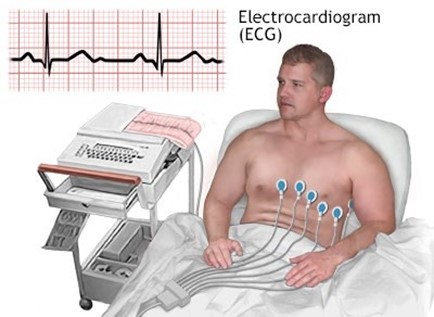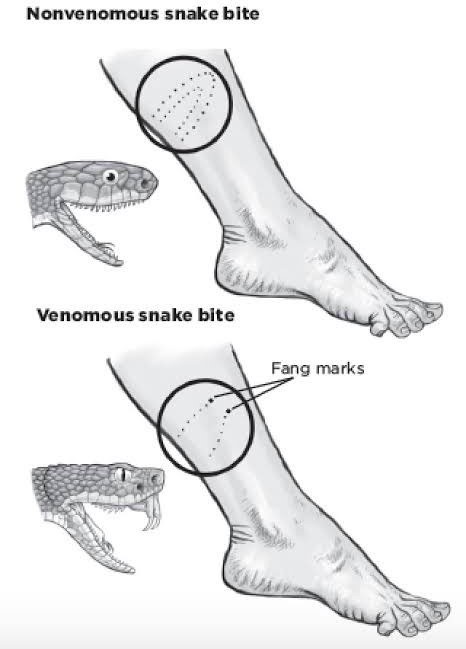A nurse is assisting with obtaining an electrocardiogram (ECG) for a client who has atrial fibrillation. Which of the following actions should the nurse take? (Select all that apply.)
Inspect the electrode pads
Instruct the client not to talk during the test
Administer an analgesic prior to the procedure
Wash the skin with plain water before placing the electrodes
Keep the client NPO after midnight
Correct Answer : A,B
Choice A: Inspecting the electrode pads is an action that the nurse should take. The electrode pads are adhesive patches that atach to the skin and connect to the ECG machine. The nurse should inspect the electrode pads for expiration date, cleanliness, and stickiness, and replace them if necessary. The nurse should also check for any signs of skin irritation or allergy from the electrode pads.
Choice B: Instructing the client not to talk during the test is an action that the nurse should take. Talking during the test can interfere with the ECG recording and cause artifacts or false readings. The nurse should instruct the client to remain still and quiet during the test, and avoid any movements or activities that can affect the heart rate or rhythm, such as coughing, deep breathing, or shivering.
Choice C: Administering an analgesic prior to the procedure is not an action that the nurse should take. An analgesic is a pain reliever that can be given orally, intravenously, or topically. An analgesic is not necessary for an ECG, as it is a noninvasive and painless procedure. An analgesic can also alter the heart rate or rhythm and affect the ECG results. The nurse should only administer an analgesic if prescribed by the provider for another reason.
Choice D: It is more common to use alcohol swabs, and not water, to clean the skin as they are better at removing oils and ensuring good adhesion of the electrodes.
Choice E: Keeping the client NPO after midnight is not an action that the nurse should take. NPO means nothing by mouth, which is a restriction of food and fluids before certain procedures or surgeries. NPO is not required for an ECG, as it does not involve any anesthesia or sedation. The nurse should allow the client to eat and drink normally before and after the test, unless instructed otherwise by the provider.

Nursing Test Bank
Naxlex Comprehensive Predictor Exams
Related Questions
Correct Answer is A
Explanation
The correct answer is: a. Place a black tag on the client’s upper body and attempt to help the next client in need.
Choice A: Place a black tag on the client’s upper body and attempt to help the next client in need.
In mass casualty incidents, the START (Simple Triage and Rapid Treatment) triage system is often used. According to this system, if a patient is apneic (not breathing) and does not resume breathing after repositioning the airway, they are considered deceased or non-salvageable and should be tagged with a black tag. This allows the nurse to focus on other victims who have a higher chance of survival.
Choice B: Start CPR
While starting CPR might seem appropriate in a normal setting, during a mass casualty incident, resources and time are limited. The priority is to save as many lives as possible. Performing CPR on an apneic patient with a weak pulse would take significant time and resources that could be used to help other victims with a higher chance of survival.
Choice C: Place a red tag on the client’s upper body and obtain immediate help from other personnel.
A red tag is used for patients who need immediate care and have a high chance of survival if treated promptly. Since the client remains apneic even after repositioning the airway, they do not meet the criteria for a red tag.
Choice D: Reposition the client’s upper airway a second time before assessing his respirations.
Repositioning the airway a second time is not recommended in the START triage system. If the patient does not resume breathing after the initial repositioning, they are considered non-salvageable.
Correct Answer is C
Explanation
Choice A: Removing the elastic bandages is not recommended. These bandages help slow the spread of venom by compressing the lymphatic vessels. Removing them could worsen the envenomation.
Choice B: This is incorrect. The nurse should not discharge the client, as they may develop serious complications from the snake bite, such as swelling, bleeding, infection, or shock. The client should be monitored closely and treated accordingly.
Choice C: This is the correct action. Antivenom treatment is crucial for serious snake envenomation. The sooner it can be administered, the better the outcome.
Choice D: While pain management is important, it is not the priority in this situation. Antivenom takes precedence over pain medication.

Whether you are a student looking to ace your exams or a practicing nurse seeking to enhance your expertise , our nursing education contents will empower you with the confidence and competence to make a difference in the lives of patients and become a respected leader in the healthcare field.
Visit Naxlex, invest in your future and unlock endless possibilities with our unparalleled nursing education contents today
Report Wrong Answer on the Current Question
Do you disagree with the answer? If yes, what is your expected answer? Explain.
Kindly be descriptive with the issue you are facing.
